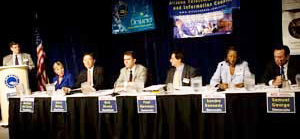Single issues, non-partisans could decide key races in the General Election
By Phil Riske
Managing Editor, Rose Law Group Reporter
President Bill Clinton carried Arizona in 1996, the first Democrat presidential candidate to do so in 44 years. He had support from 60 percent of independents, a sizable share of crossover Republican women and high Hispanic turnout.
It was a lost opportunity, nevertheless, for down-ballot Democrats, who “were relegated to obscurity,” said The Arizona Republic.
“I’ve anticipated this for some period of time,” Corporation Commission Chairman Renz Jennings, the last-standing Democrat state officer that year. “People are falling left and right of me . . .”
Two years later and despite Clinton’s popularity, Republican John McCain was reelected as Arizona U.S. senator, with 67 percent of the vote.
In 2008, McCain as the party’s presidential nominee edged out Barack Obama, but Republicans lost five seats in the Legislature.
In these and other elections, an independent-spirited Arizona clips coattails.
So, what about Nov. 6, 2012?
Mitt Romney is favored to win Arizona by six points, according to recent polls. His Republican Party holds a voter registration advantage of 165,000 over Democrats, but only 65,000 over independent and “other” registered voters.
With a theorized counterbalancing of Republicans dissatisfied with Romney versus Democrats disappointed in Obama, the rest of the partisan electorate would be expected to vote the party line.
National polls over the years show independent voters tend to skew slightly Democrat, and if that holds true in Arizona this year, It still might not be enough to upset Romney, but could affect closer races, such as that between Democrat Richard Carmona and GOP Congressman Jeff Flake in the contest to replace the retiring Jon Kyl in the U.S. Senate.
With the exceptions of six Arizona congressional races and certain legislative races, there are no election slam-dunks in Arizona this year. It’s a volatile year in a state that has changed politically in the past 15 years with the surge of independent voters and demographically with the near 30 percent Latino population.
The state also has ushered in a new wave of technology and technological industries, notably in the field of solar energy.
Based on this backdrop and for sake of argument, let’s focus on issues as down-ballot “deciders.”
Flake vs. Carmona
Although some polls had Carmona up on Flake several weeks ago, Rasmussen last week gave Flake a four-point edge.
Carmona has helped build a viable campaign in large part with the help of Latino voters. He echoed one of the community’s main critiques of his own party: They haven’t done enough in Washington to pass immigration reform.
“They screwed up. They screwed up, there is no question and I’m not going to try to defend them,” he said during a debate with Flake hosted by The Arizona Republic. “I wouldn’t have supported that.”
Carmona also accused Flake, who once sponsored comprehensive immigration reform legislation of being a “flip-flopper” on the issue.
Flake says the country needs comprehensive reform, but only after the border is secure.
“No one will trust the federal government on the other items,” unless that is done, he said. He called his stance “a bow to reality.”
Arizona Democratic strategist Mario Diaz described the coattail effect he expects from him as like a bridal train: “It’s so long that everybody’s going to ride this tail,” Diaz said. “And really, the Latino population is more motivated to flex its political muscle than I’ve seen it in my 26 years in Arizona.”
It’s still uncertain whether Latinos will show up to the polls in great enough numbers to shift the race this year. Latinos are nearly 30 percent of the population now; two years ago, however, Democratic gubernatorial candidate Terry Goddard won 71 percent of the Latino vote but still lost to Republican Jan Brewer, the godmother of the SB 1070 law.
“On issues such as immigration reform, I’ve demonstrated that I can work with Democrats on complex issues to find sensible middle ground,” wrote Flake in a recent op-ed piece in The Arizona Republic
Public views on immigration policies
While illegal immigration remains much on the minds of Arizona voters, but enough single-issue voters could bring about a closer race for the Senate, depending on public opinion.
The Merrill/Morrison Institute Poll found 78 percent of Arizonans surveyed said they would support legislation for undocumented longtime residents to become citizens if they pay a fine, pass a criminal background check here and their nation of origin, get a taxpayer I.D. number and demonstrate they can speak English.
In April, Merrill/Morrison found nearly three-quarters of Arizona registered voters are in favor of the Dream Act, which would allow undocumented immigrants who graduate from college or serve in the military to become U.S. citizens.
On the heels of the latter poll, President Obama issued directive in June that immigrants brought illegally to the United States as children be exempted from deportation and granted work permits if they apply.
Government has deported a record number of illegal immigrants under Obama.
“While we know that 60 percent of the voters in Arizona generally support SB 1070, it is obvious that illegal immigration is a very complex issue,” said Dr. Bruce Merrill, senior fellow at Morrison Institute and the poll’s director. “For instance, we have found in other polls that 75 to 80 percent of Arizonans want tighter border security but at the same time, a majority also support a citizenship track for families that have lived here for a number of years, many of whom have children who are United States citizens. So it is not really surprising that we found support in this poll for the Dream Act.”
In the statewide poll, 73 percent supported the Dream Act proposal, while 22 percent were opposed and 5 percent had no opinion. While Democrats were most supportive of the Dream Act, a majority of Republicans, Democrats and political independents were supportive, as well.
Among non-Hispanic Anglos, 42 percent “strongly support” the Dream Act and 28 percent “support” it. Among Hispanics, support levels were 63 percent and 24 percent, respectively.
“While strong support for the Dream Act among Hispanics comes as no surprise, it is more important to note that 7 out of 10 Anglos also support it,” said Dr. David Daugherty, director of research at Morrison Institute. “These findings largely contradict the common impression that Arizonans are anti-Mexican immigrant.”
Romney favors U.S.-Mexico border fence, opposes education benefits to illegal immigrants, opposes offering legal status to illegal immigrants who attend college, but would do so for those who serve in the armed forces. He says he would end visa caps for spouses and minor children of legal immigrants, but would honor work permits for immigrants who benefit from Obama’s new policy.
Romney promises to put a comprehensive immigration plan into place before those permits expire.
All said, pundits and polls have Flake as the next U.S. senator from Arizona, which has not had a Democrat in that chamber since Dennis DeConcini retired in 1994.
Arizona Corporation Commission

Obama and Romney agree the U.S. is too dependent on foreign oil, but their views differ significantly on how to reduce or even end that dependence to make the country energy self-sufficient.
President Obama has been a champion of expanding renewable energy sources, such as wind and solar power, which he says hold great promise.
Romney is a proponent of raising production levels of America’s own fossil fuels, including coal, which the U.S. has in abundance.
The candidates differ over the portion of renewable resources should have in the United States’ energy mix. President Obama has spent $90 billion in grants and loan guarantees for clean energy companies. Obama also wants Congress to extend tax credits for wind energy, while Romney does not.
In 2006, the Arizona Corporation Commission (ACC) approved the Renewable Energy Standard and Tariff (REST), requiring regulated electric utilities to generate 15 percent of their energy from renewable resources by 2025. The standards encourage utilities to use solar, wind, biomass, biogas, geothermal and other similar technologies to generate “clean” energy to power Arizona’s future.
None of the ACC candidates wants to dismantle the REST, but rather the Democrats in the race want to increase the standard.
Incumbents – Republican Bob Stump and Democrats Paul Newman and Sandra Kennedy – are seeking second four-year terms on the five-member commission. Newman and Kennedy ran as “the Solar Team” and became the first two Democrats to sit on the Corporation Commission since 1999. Newcomer Marcia Busching is the third Democrat candidate.
Two Republicans – former Senate President Bob Burns and former Central Arizona Water Conservation District Board member Susan Bitter Smith also vie for a seat on the commission
Libertarian Christopher Gohl and Green Party candidates Daniel Pout and Thomas Meadows also are on the ballot.
While the candidates say they’re pleased with the progress of renewable-energy development in the state, Newman says the standard should be boosted, citing a 2011 survey conducted for Arizona Public Service Co. that showed 94 percent of Arizonans favor more solar energy and are willing to pay for it.
The Republican candidates say the current renewable-energy standard is sufficient, and increasing the requirement would be too costly for ratepayers.
Here again, issues, in this case, renewable energy, not to mention utility rate controls, will be the coattails worn by the winners, not their party affiliation.
If you’d like to discuss energy issues, contact Court Rich, crich@roselawgroup.com











